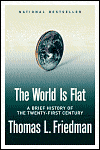The World Is Flat
Book #25 of my '06 reading list was Thomas Friedman's The World Is Flat: A Brief History of the Twenty-First Century.
I found the first half of the book to be very eye opening. It's the kind of book that can change the way you think about the world. It's not that Friedman is saying anything earth-shattering in and of itself, but what he does do well is sum up a number of interesting trends that tend to get lost unless you spend a lot of time thinking about this kind of stuff. In the first few chapter Friedman explains his assertion that the world has "flattened" over the last couple decades largely due to various technological and political advances. In the new flat globalized world everyone competes on an even playing field regardless of physical location. WikiPedia has an excellent outline of the book which you can skim to get a good overview of Friedman's basic thesis. I thought the second half of the book (focusing on how America and other countries can survive in this new world) trailed off as the topic starts to wear after a bit. On the whole though I thought it was an interesting read.
This is another one of those books that's been reviewed a bazillion times on the web already. The reviews seem to range from amazing to terrible, which I imagine is largely due to the fact that Friedman touches on some pretty sensitive political and social topics. At times he can come off as a bit too optimistic or pro-globalization, but on the whole I think he provides a nuanced position that is relatively even-handed.
You can read an excerpt from the first chapter of the book here.
Watch Friedman lecture at MIT
Listen to NPR story
New York Times review
Washington Post review
Bill Gates on the flat world

Labels: books



0 Comments:
Post a Comment
<< Home